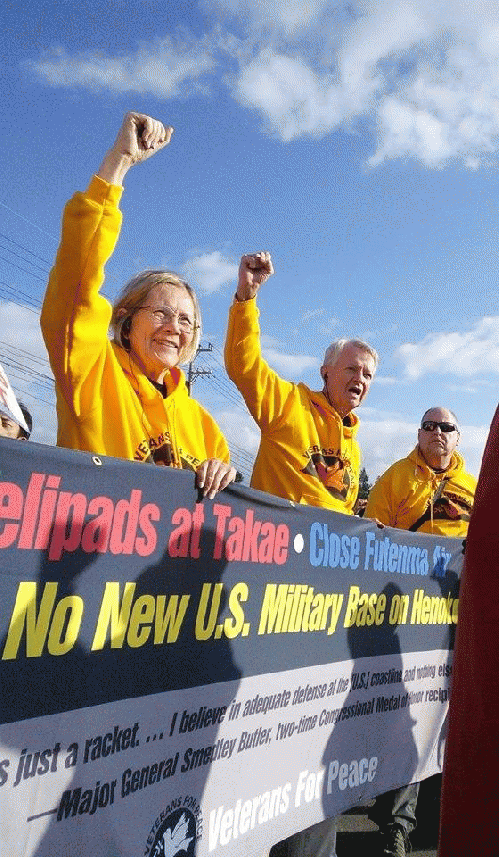
Panel at the Symposium on the effects of US Military Bases in Okinawa at Naha City, Okinawa -- with Dud Hendrick, Bruce Gagnon, Eiko Ginoza and Suzuyo Takazato
(Image by Ann Wright) Details DMCA
I am honored to speak at this symposium in Okinawa about the need to abolish United States military bases around the world, and particularly here in Okinawa where you have been subjected to these bases for over 70 years following World War II.
From the beginning, let me state that I apologize for the continuing presence of so many U.S. bases on Okinawa and the trauma they have caused to the people of Okinawa.
I worked for nearly 40 years in the United States government. I served 29 years in the U.S. Army/Army Reserves and retired as a Colonel. I was also a U.S. diplomat for 16 years and served in U.S. Embassies in Nicaragua, Grenada, Somalia, Uzbekistan, Kyrgyzstan, Sierra Leone, Micronesia, Afghanistan and Mongolia.
However, in March 2003, I was one of three U.S. government employees who resigned in opposition to President Bush's war on Iraq. Since then I, as well as everyone on our Veterans for Peace delegation, have been publicly challenging policies of the Bush and Obama administrations on a variety of international and domestic issues including extraordinary rendition, unlawful imprisonment, torture, assassin drones, police brutality, mass incarceration, and U.S. military bases around the world, including of course, the U.S. military bases here on Okinawa
I was last here on Okinawa in 2007 with a delegation from the Japan chapter of CODEPINK: Women for Peace, a delegation that went first to Guam to witness the U.S. military build-up on that island and then here to Okinawa to join with the citizen protest against the U.S. proposal to build the runway of the U.S. Marine Base into the South China Sea.

Veterans for Peace at Camp Schwab main gate for protests of US Marine runway into the South China sea at Henoko, Okinawa -- with Chuck Searcy and Dan Shea.
(Image by Ann Wright) Details DMCA
Today I want to speak about the need to abolish foreign military bases around the world.
I returned two weeks ago from an international conference called "Abolition of Foreign Military Bases" in Guantanamo, Cuba. As you may know, the oldest foreign military base in the world is the U. S. Naval Base in Guantanamo, Cuba. The U.S. has maintained control of this military base for 112 years and claims the rights to the land in "perpetuity" through a lease obtained from a U.S. puppet government. The U.S. sends a check for $4,085 per year for this lease, checks that the Cuban government has never cashed.
U.S. Military bases on soil other than the United States, provides the U.S. the cover to conduct illegal and criminal actions on those bases that violate U.S. law using the excuse that U.S. law does not apply.
The sordid history of the past 14 years of the United States imprisoning 779 persons from 48 countries on a U.S. military base in Cuba as a part of its global war "on terror" reflects the mentality of those who govern the United States -- global intervention for political or economic reasons, invasion, occupation other countries and leaving its military bases in those countries for decades.
The infamous U.S. prison on the U.S. Naval Base has imprisoned beginning in January 2002. After nearly 14 years of imprisonment in Guantanamo prison, 107 prisoners remain. 47 of them were cleared for release years ago and are still held, and incomprehensibly, the U.S. maintains that 46 will be imprisoned indefinitely without charge or trial. Only eight have been convicted of any crime.
Let me assure you, we in the United States continue our struggle demanding a trial for all prisoners, the closing of the prison in Guantanamo and the return of the land to the people of Cuba.
The U.S. military base is of no strategic importance to the United States, but instead is used as the symbol of U.S. imperialism to the revolution of Cuba and the U.S. attempts over the past 60 years to overthrow the revolution.
Over the past 100 years, Cuba, Nicaragua, El Salvador, Guatemala, Honduras, Grenada, Haiti, Germany, Italy, Spain, the Netherlands, Japan, Korea, the Philippines, Afghanistan, Iraq, Iran, Pakistan, Bahrain, Kuwait, Qatar, Saudi Arabia, Libya, Somalia, Djibouti, Diego Garcia have had the presence of U.S. military in their countries.
Today, the United States empire has over 800 U.S. military installations around the world. In his excellent, recently released book "Base Nation: How U.S. Military Bases Abroad Harm America and the World," David Vine documents that even after hundreds of bases in Iraq and Afghanistan have been closed, the U.S. still has bases ranging in size from mega "Little Americas" to small radar facilities in more than 80 countries.
(Note: You can view every article as one long page if you sign up as an Advocate Member, or higher).





